经济适用房案例分析
经济适用房销售案例20080109
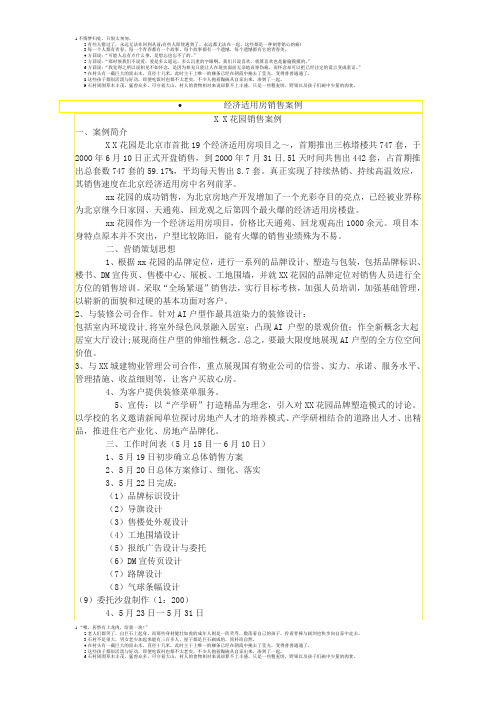
5.方茴说:“那时候我们不说爱,爱是多么遥远、多么沉重的字眼啊。
我们只说喜欢,就算喜欢也是偷偷摸摸的。
”6.方茴说:“我觉得之所以说相见不如怀念,是因为相见只能让人在现实面前无奈地哀悼伤痛,而怀念却可以把已经注定的谎言变成童话。
”7.在村头有一截巨大的雷击木,直径十几米,此时主干上唯一的柳条已经在朝霞中掩去了莹光,变得普普通通了。
8.这些孩子都很活泼与好动,即便吃饭时也都不太老实,不少人抱着陶碗从自家出来,凑到了一起。
9.石村周围草木丰茂,猛兽众多,可守着大山,村人的食物相对来说却算不上丰盛,只是一些粗麦饼、野果以及孩子们碗中少量的肉食。
1.“噢,居然有土龙肉,给我一块!”2.老人们都笑了,自巨石上起身。
而那些身材健壮如虎的成年人则是一阵笑骂,数落着自己的孩子,拎着骨棒与阔剑也快步向自家中走去。
5.方茴说:“那时候我们不说爱,爱是多么遥远、多么沉重的字眼啊。
我们只说喜欢,就算喜欢也是偷偷摸摸的。
”6.方茴说:“我觉得之所以说相见不如怀念,是因为相见只能让人在现实面前无奈地哀悼伤痛,而怀念却可以把已经注定的谎言变成童话。
”7.在村头有一截巨大的雷击木,直径十几米,此时主干上唯一的柳条已经在朝霞中掩去了莹光,变得普普通通了。
8.这些孩子都很活泼与好动,即便吃饭时也都不太老实,不少人抱着陶碗从自家出来,凑到了一起。
9.石村周围草木丰茂,猛兽众多,可守着大山,村人的食物相对来说却算不上丰盛,只是一些粗麦饼、野果以及孩子们碗中少量的肉食。
1.“噢,居然有土龙肉,给我一块!”2.老人们都笑了,自巨石上起身。
而那些身材健壮如虎的成年人则是一阵笑骂,数落着自己的孩子,拎着骨棒与阔剑也快步向自家中走去。
5.方茴说:“那时候我们不说爱,爱是多么遥远、多么沉重的字眼啊。
我们只说喜欢,就算喜欢也是偷偷摸摸的。
”6.方茴说:“我觉得之所以说相见不如怀念,是因为相见只能让人在现实面前无奈地哀悼伤痛,而怀念却可以把已经注定的谎言变成童话。
北京继承经适房案例
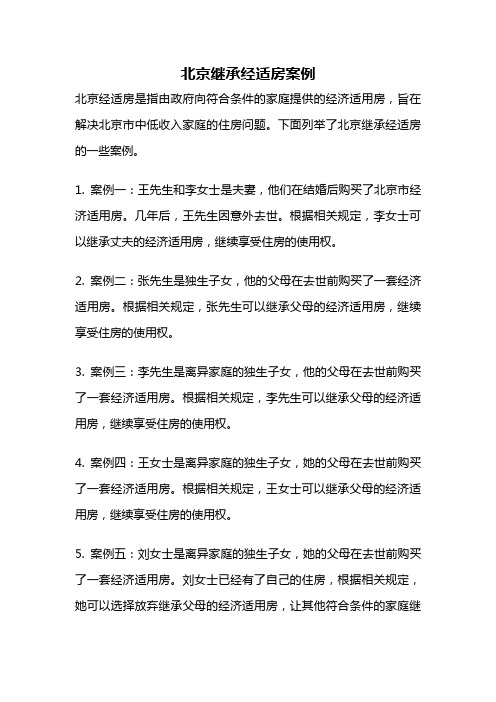
北京继承经适房案例北京经适房是指由政府向符合条件的家庭提供的经济适用房,旨在解决北京市中低收入家庭的住房问题。
下面列举了北京继承经适房的一些案例。
1. 案例一:王先生和李女士是夫妻,他们在结婚后购买了北京市经济适用房。
几年后,王先生因意外去世。
根据相关规定,李女士可以继承丈夫的经济适用房,继续享受住房的使用权。
2. 案例二:张先生是独生子女,他的父母在去世前购买了一套经济适用房。
根据相关规定,张先生可以继承父母的经济适用房,继续享受住房的使用权。
3. 案例三:李先生是离异家庭的独生子女,他的父母在去世前购买了一套经济适用房。
根据相关规定,李先生可以继承父母的经济适用房,继续享受住房的使用权。
4. 案例四:王女士是离异家庭的独生子女,她的父母在去世前购买了一套经济适用房。
根据相关规定,王女士可以继承父母的经济适用房,继续享受住房的使用权。
5. 案例五:刘女士是离异家庭的独生子女,她的父母在去世前购买了一套经济适用房。
刘女士已经有了自己的住房,根据相关规定,她可以选择放弃继承父母的经济适用房,让其他符合条件的家庭继承。
6. 案例六:杨先生是离异家庭的独生子女,他的父母在去世前购买了一套经济适用房。
杨先生已经有了自己的住房,根据相关规定,他可以选择放弃继承父母的经济适用房,让其他符合条件的家庭继承。
7. 案例七:张女士是独生子女,她的父母在去世前购买了一套经济适用房。
张女士已经有了自己的住房,根据相关规定,她可以选择放弃继承父母的经济适用房,让其他符合条件的家庭继承。
8. 案例八:王先生是独生子女,他的父母在去世前购买了一套经济适用房。
王先生已经有了自己的住房,根据相关规定,他可以选择放弃继承父母的经济适用房,让其他符合条件的家庭继承。
9. 案例九:陈女士是离异家庭的独生子女,她的父母在去世前购买了一套经济适用房。
陈女士已经有了自己的住房,根据相关规定,她可以选择放弃继承父母的经济适用房,让其他符合条件的家庭继承。
经济适用房成本监审案例分析
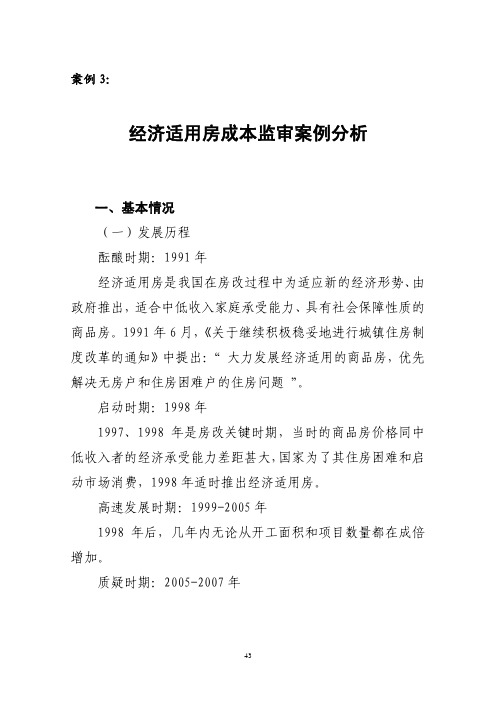
案例3:经济适用房成本监审案例分析一、基本情况(一)发展历程酝酿时期:1991年经济适用房是我国在房改过程中为适应新的经济形势、由政府推出,适合中低收入家庭承受能力、具有社会保障性质的商品房。
1991年6月,《关于继续积极稳妥地进行城镇住房制度改革的通知》中提出:“ 大力发展经济适用的商品房,优先解决无房户和住房困难户的住房问题 ”。
启动时期:1998年1997、1998年是房改关键时期,当时的商品房价格同中低收入者的经济承受能力差距甚大,国家为了其住房困难和启动市场消费,1998年适时推出经济适用房。
高速发展时期:1999-2005年1998 年后,几年内无论从开工面积和项目数量都在成倍增加。
质疑时期:2005-2007年1、闲置,“高租售率”;2、难以购买;3、开奔驰,宝马购房。
转型时期:2007年8月-至今《国务院关于解决城市低收入家庭住房困难的若干意见》提出改进和规范经济适用住房制度。
(申购、交易等环节严格审核)十七大报告作为党代会报告中第一次专门提及住房保障制度,提出健全廉租住房制度。
4万亿投资结构中廉租住房、棚户区改造等保障性住房为4000亿元 ,占一成。
发展方向:廉租房、经济适用房房和限价商品房共同组成未来保障性用房体系。
(二)相关政策1994年《城镇经济适用住房建设管理办法》;2002年《经济适用住房价格管理办法》(价格政策);2004年《经济适用住房管理办法》,2007年修订。
价格政策重点解读:经济适用房实行政府指导价,县级以上政府价格主管部门依法对本地区经济适用房价格实施管理。
经济适用房基准价格由开发成本、税金和利润三部分构成。
(《经济适用住房价格管理办法》)某省具体价格政策《某省经济适用住房管理办法》部分条文:经济适用房销售价格实行基本保障面积和超面积区别定价模式,其中基本保障面积内按照保本微利原则制定价格,超面积部分参照同地段商品房的平均价格水平予以核定。
具体零售单套住房,以基准价格为基础,计算楼层、朝向差价,差价按整幢(单元)增减的代数和为零的原则确定。
最高人民法院关于审理购买经济适用房指导性案例

最高人民法院关于审理购买经济适用房指导性案例最高院在指导案例17-19 (刘昌林诉王利辉等诉深圳市中瑞房地产开发有限公司、深圳市新瑞成房地产开发有限公司土地使用权转让纠纷案)案例1:申请人王利辉(以下简称“原被告”)与被告王利辉签订《经济适用住房购买合同》,约定被告王利辉购买该经济适用住房一套。
原告王利辉以其已与原被告签订了《经济适用住房购买合同》为由,向法院提起诉讼,请求判令原被告解除《经济适用住房认购书》并退还所购房屋。
在庭审中,原、被告之间是否存在代持、附条件过户等民事行为达成了一致意见:原、某系夫妻关系,在法院主持下签署协议一式两份。
双方就上述事项均有书面约定。
原告现要求解除协议并返还所购房屋,法院不予支持。
本案中,原、业主就《商品房买卖合同》以及相关的补充协议达成一致意见,属于合法有效的合同;原告向法院起诉要求解除《经济适用房认购书》且归还所购房屋的要求,人民法院不予支持。
现已审理终结。
一、案情简介原告王利辉与被告王利辉系夫妻关系。
2004年7月6日,被告王利辉在其户籍所在地的街道办事处签订《经济适用住房购买合同》,约定被告王利辉购买经济适用住房一套,房屋面积为88.25平方米(套内建筑面积为88.25平方米)。
合同签订后,被告王利辉以个人名义为原告王利辉垫付了37万元购房款。
2004年8月25日,被告王利辉与被告王 XX签订了《商品房买卖合同》。
合同约定被告王利辉用其合法个人资本投入于深圳市福田区福强路某小区开发项目建设中,由被告王利辉在该小区取得商品房预售许可证后,以人民币100万元作为其全部购房款。
合同签订后,房屋产权证在业主名下已办理。
2005年1月5日被告王利辉到福田区中瑞房地产开发有限公司交纳剩余购房款17万元后持原房产证到开发商处申请办理产权过户手续。
2009年4月28日业主王利辉将房产证到银行并办理了抵押登记手续。
2012年5月12日被告王利辉委托被告王XX代为将涉案房产转让给被告人王 XX。
住房保障法律责任案例(3篇)

第1篇一、基本案情张某,男,35岁,某市居民。
张某原居住在某市某小区,因房屋质量问题导致墙体开裂,居住环境恶劣。
张某多次与开发商协商维修事宜,但开发商以各种理由推脱,拒绝承担维修责任。
张某无奈之下,向当地住房保障部门申请住房保障。
经调查,张某符合住房保障条件,住房保障部门为其分配了一套经济适用房。
然而,在入住过程中,张某发现房屋存在严重的质量问题,严重影响居住安全。
张某再次与开发商协商,要求其承担维修责任。
开发商仍然以各种理由推脱,拒绝承担责任。
张某遂向当地人民法院提起诉讼,要求开发商承担维修责任,并赔偿其因此遭受的损失。
二、争议焦点1. 开发商是否应当承担房屋维修责任?2. 开发商是否应当赔偿张某因此遭受的损失?三、法院判决1. 开发商应当承担房屋维修责任。
根据《中华人民共和国合同法》第一百零九条规定:“当事人一方不履行合同义务或者履行合同义务不符合约定的,应当承担继续履行、采取补救措施或者赔偿损失等违约责任。
”本案中,开发商在张某购房时,与张某签订了购房合同,合同中明确约定了房屋的质量标准。
然而,开发商交付的房屋存在严重的质量问题,已不符合合同约定的质量标准。
因此,开发商应当承担房屋维修责任。
2. 开发商应当赔偿张某因此遭受的损失。
根据《中华人民共和国侵权责任法》第十九条规定:“因产品存在缺陷造成他人损害的,生产者应当承担侵权责任。
”本案中,开发商交付的房屋存在严重的质量问题,已构成产品缺陷。
张某因房屋质量问题遭受的损失,包括维修费用、搬家费用、精神损失等。
根据法律规定,开发商应当赔偿张某因此遭受的损失。
四、法律依据1. 《中华人民共和国合同法》2. 《中华人民共和国侵权责任法》3. 《中华人民共和国城市房地产管理法》4. 《经济适用住房管理办法》五、案例评析1. 住房保障是政府的一项重要职责,住房保障部门在审核申请人资格时,应严格把关,确保符合条件的居民得到住房保障。
2. 开发商在销售房屋过程中,应保证房屋质量,不得以次充好。
借名购买经济适用房的案例分析

借名购买经济适⽤房的案例分析借名购买经济适⽤房的案例分析基本案情原告孙xx诉称:2003年9⽉x⽇,原告与被告就借名购房⼀事签署协议。
协议约定:1、原告以被告名义购买天通苑×区×#×房⼀套;2、所有房款由原告承担;3、原告付清全部房款后,被告协助办理过户⼿续;4、被告需要买房时,提前3个⽉通知原告,原告在30⽇内还清银⾏贷款并在45⽇内将产权过户到原告名下,以便被告再⾏购买商品房和经济适⽤房。
协议签署后,原告以被告名义签订了购房合同并在第三⼈中国银⾏昌平⽀⾏处办理了抵押借款⼿续,交付了⾸付房款,按⽉偿还贷款。
房屋交付⾄今,由原告长期居住与使⽤。
2004年8⽉16⽇,该房屋办理了产权证,产权⼈登记为被告,产权证号为京昌×字第×号。
2013年9⽉x⽇,该房屋贷款已由原告全部还清,因被告拒不协助办理解除抵押⼿续,现该房屋仍未解押。
近两年,原告多次要求被告办理过户⼿续,但是被告在收取原告10万元补偿款后,⾄今拒不配合,且多次协商⽆果,故原告提起本诉,请求判令:1、第三⼈办理北京市昌平区东⼩⼝镇天通苑×区×号楼×幢×号房屋的解除抵押⼿续;2、被告协助原告将北京市昌平区东⼩⼝镇天通苑×区×号楼×幢×号房屋办理⾄原告名下。
被告周x辩称:不同意原告诉讼请求。
购房时原告不具有经济适⽤房资格,故诱骗被告⽤⾃⼰的指标帮其抢占经济适⽤房房源,承诺待其取得经济适⽤房资格后过户,被告可另⾏申购经济适⽤房。
2014年3⽉,被告与原告多次确认后得知,原告在签订协议的12年间,始终⽆法如约取得经济适⽤房资格并办理过户⼿续,⽽被告购买保障性住房的权益因此长期受到损害。
这期间,原告也并未主动提出过户事宜,反⽽是被告提出过户⽽原告⼀再搪塞,后来原告甚⾄要求被告转卖房屋给他⼈,帮助原告炒房,被告为了保障⾃⼰的经济适⽤房申购资格⽽拒绝了原告的要求。
经济适用房纠纷案例
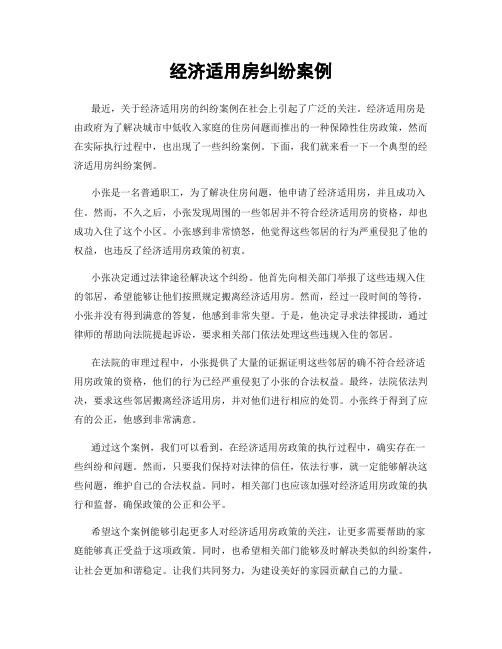
经济适用房纠纷案例最近,关于经济适用房的纠纷案例在社会上引起了广泛的关注。
经济适用房是由政府为了解决城市中低收入家庭的住房问题而推出的一种保障性住房政策,然而在实际执行过程中,也出现了一些纠纷案例。
下面,我们就来看一下一个典型的经济适用房纠纷案例。
小张是一名普通职工,为了解决住房问题,他申请了经济适用房,并且成功入住。
然而,不久之后,小张发现周围的一些邻居并不符合经济适用房的资格,却也成功入住了这个小区。
小张感到非常愤怒,他觉得这些邻居的行为严重侵犯了他的权益,也违反了经济适用房政策的初衷。
小张决定通过法律途径解决这个纠纷。
他首先向相关部门举报了这些违规入住的邻居,希望能够让他们按照规定搬离经济适用房。
然而,经过一段时间的等待,小张并没有得到满意的答复,他感到非常失望。
于是,他决定寻求法律援助,通过律师的帮助向法院提起诉讼,要求相关部门依法处理这些违规入住的邻居。
在法院的审理过程中,小张提供了大量的证据证明这些邻居的确不符合经济适用房政策的资格,他们的行为已经严重侵犯了小张的合法权益。
最终,法院依法判决,要求这些邻居搬离经济适用房,并对他们进行相应的处罚。
小张终于得到了应有的公正,他感到非常满意。
通过这个案例,我们可以看到,在经济适用房政策的执行过程中,确实存在一些纠纷和问题。
然而,只要我们保持对法律的信任,依法行事,就一定能够解决这些问题,维护自己的合法权益。
同时,相关部门也应该加强对经济适用房政策的执行和监督,确保政策的公正和公平。
希望这个案例能够引起更多人对经济适用房政策的关注,让更多需要帮助的家庭能够真正受益于这项政策。
同时,也希望相关部门能够及时解决类似的纠纷案件,让社会更加和谐稳定。
让我们共同努力,为建设美好的家园贡献自己的力量。
经济适用房法律纠纷(2篇)
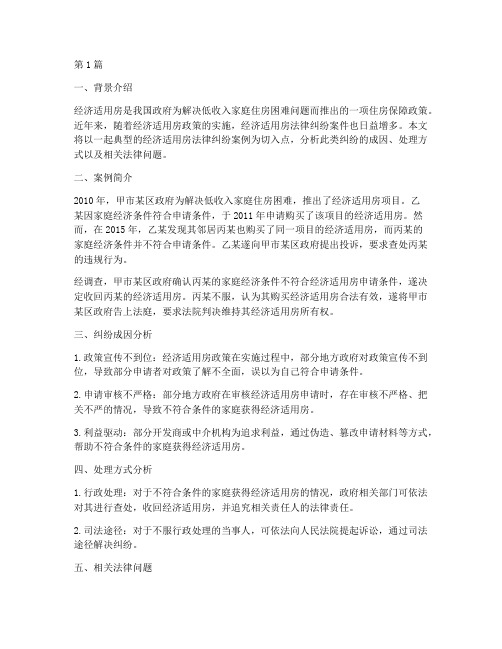
第1篇一、背景介绍经济适用房是我国政府为解决低收入家庭住房困难问题而推出的一项住房保障政策。
近年来,随着经济适用房政策的实施,经济适用房法律纠纷案件也日益增多。
本文将以一起典型的经济适用房法律纠纷案例为切入点,分析此类纠纷的成因、处理方式以及相关法律问题。
二、案例简介2010年,甲市某区政府为解决低收入家庭住房困难,推出了经济适用房项目。
乙某因家庭经济条件符合申请条件,于2011年申请购买了该项目的经济适用房。
然而,在2015年,乙某发现其邻居丙某也购买了同一项目的经济适用房,而丙某的家庭经济条件并不符合申请条件。
乙某遂向甲市某区政府提出投诉,要求查处丙某的违规行为。
经调查,甲市某区政府确认丙某的家庭经济条件不符合经济适用房申请条件,遂决定收回丙某的经济适用房。
丙某不服,认为其购买经济适用房合法有效,遂将甲市某区政府告上法庭,要求法院判决维持其经济适用房所有权。
三、纠纷成因分析1.政策宣传不到位:经济适用房政策在实施过程中,部分地方政府对政策宣传不到位,导致部分申请者对政策了解不全面,误以为自己符合申请条件。
2.申请审核不严格:部分地方政府在审核经济适用房申请时,存在审核不严格、把关不严的情况,导致不符合条件的家庭获得经济适用房。
3.利益驱动:部分开发商或中介机构为追求利益,通过伪造、篡改申请材料等方式,帮助不符合条件的家庭获得经济适用房。
四、处理方式分析1.行政处理:对于不符合条件的家庭获得经济适用房的情况,政府相关部门可依法对其进行查处,收回经济适用房,并追究相关责任人的法律责任。
2.司法途径:对于不服行政处理的当事人,可依法向人民法院提起诉讼,通过司法途径解决纠纷。
五、相关法律问题1.经济适用房的法律性质:经济适用房属于政府为解决低收入家庭住房困难而提供的住房保障政策,其所有权归国家所有,购房人享有使用权。
2.经济适用房的购买条件:经济适用房的购买条件包括家庭收入、住房面积、家庭成员等,各地政策有所不同。
经济适用房回购案例
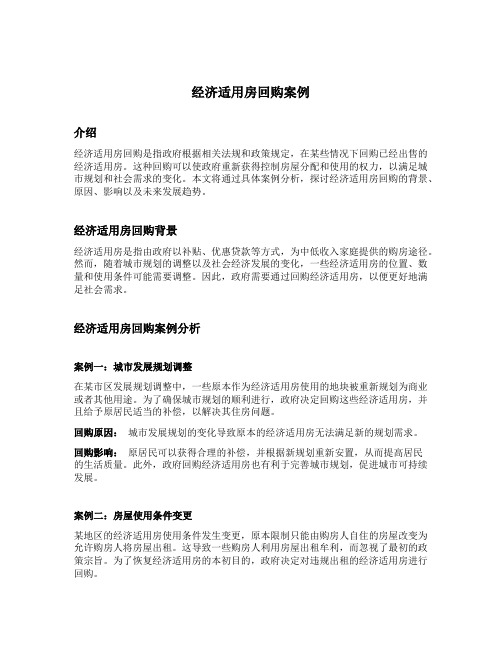
经济适用房回购案例介绍经济适用房回购是指政府根据相关法规和政策规定,在某些情况下回购已经出售的经济适用房。
这种回购可以使政府重新获得控制房屋分配和使用的权力,以满足城市规划和社会需求的变化。
本文将通过具体案例分析,探讨经济适用房回购的背景、原因、影响以及未来发展趋势。
经济适用房回购背景经济适用房是指由政府以补贴、优惠贷款等方式,为中低收入家庭提供的购房途径。
然而,随着城市规划的调整以及社会经济发展的变化,一些经济适用房的位置、数量和使用条件可能需要调整。
因此,政府需要通过回购经济适用房,以便更好地满足社会需求。
经济适用房回购案例分析案例一:城市发展规划调整在某市区发展规划调整中,一些原本作为经济适用房使用的地块被重新规划为商业或者其他用途。
为了确保城市规划的顺利进行,政府决定回购这些经济适用房,并且给予原居民适当的补偿,以解决其住房问题。
回购原因:城市发展规划的变化导致原本的经济适用房无法满足新的规划需求。
回购影响:原居民可以获得合理的补偿,并根据新规划重新安置,从而提高居民的生活质量。
此外,政府回购经济适用房也有利于完善城市规划,促进城市可持续发展。
案例二:房屋使用条件变更某地区的经济适用房使用条件发生变更,原本限制只能由购房人自住的房屋改变为允许购房人将房屋出租。
这导致一些购房人利用房屋出租牟利,而忽视了最初的政策宗旨。
为了恢复经济适用房的本初目的,政府决定对违规出租的经济适用房进行回购。
回购原因:购房人滥用房屋出租权益,违背了经济适用房政策初衷。
回购影响:回购可以收回被滥用的房屋,并且重新分配给符合条件的家庭,保证经济适用房政策的有效执行。
此举也起到了警示作用,提醒购房人遵守相应规定,维护经济适用房政策的公平性和稳定性。
经济适用房回购的影响与未来发展趋势经济适用房回购是一个重要的政策工具,它能够维护城市规划的一致性,保障住房需求的公平性和稳定性。
然而,经济适用房回购也面临一些挑战和问题。
未来,政府应当进一步完善回购制度,平衡各方利益,加强监管和执行力度,以确保回购政策的公正和有效。
经济适用房销售案例分析
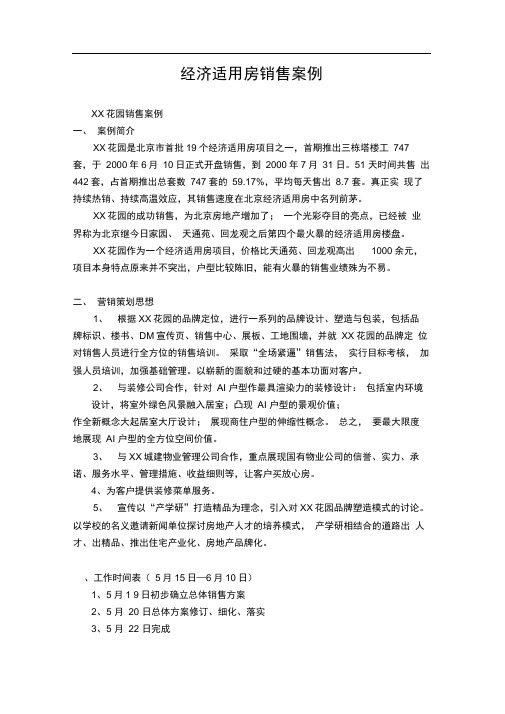
经济适用房销售案例XX花园销售案例一、案例简介XX花园是北京市首批19个经济适用房项目之一,首期推出三栋塔楼工747 套,于2000年6月10日正式开盘销售,到2000年7月31 日。
51 天时间共售出442套,占首期推出总套数747套的59.17%,平均每天售出8.7 套。
真正实现了持续热销、持续高温效应,其销售速度在北京经济适用房中名列前茅。
XX花园的成功销售,为北京房地产增加了;一个光彩夺目的亮点,已经被业界称为北京继今日家园、天通苑、回龙观之后第四个最火暴的经济适用房楼盘。
XX花园作为一个经济适用房项目,价格比天通苑、回龙观高出1000余元,项目本身特点原来并不突出,户型比较陈旧,能有火暴的销售业绩殊为不易。
二、营销策划思想1、根据XX花园的品牌定位,进行一系列的品牌设计、塑造与包装,包括品牌标识、楼书、DM宣传页、销售中心、展板、工地围墙,并就XX花园的品牌定位对销售人员进行全方位的销售培训。
采取“全场紧逼”销售法,实行目标考核,加强人员培训,加强基础管理。
以崭新的面貌和过硬的基本功面对客户。
2、与装修公司合作,针对AI 户型作最具渲染力的装修设计:包括室内环境设计,将室外绿色风景融入居室;凸现AI 户型的景观价值;作全新概念大起居室大厅设计;展现商住户型的伸缩性概念。
总之,要最大限度地展现AI 户型的全方位空间价值。
3、与XX城建物业管理公司合作,重点展现国有物业公司的信誉、实力、承诺、服务水平、管理措施、收益细则等,让客户买放心房。
4、为客户提供装修菜单服务。
5、宣传以“产学研”打造精品为理念,引入对XX花园品牌塑造模式的讨论。
以学校的名义邀请新闻单位探讨房地产人才的培养模式,产学研相结合的道路出人才、出精品、推出住宅产业化、房地产品牌化。
、工作时间表(5月15日—6月10日)1、5月1 9日初步确立总体销售方案2、5月20 日总体方案修订、细化、落实3、5月22 日完成(1)品牌标识设计(2)刀旗设计(3)售楼处外观设计(4)工地围墙设计(5)报纸广告设计(6)DM宣传页设计( 7 )路牌设计( 8)气球条幅设计( 9)委托沙盘制作( 1:200)4、5 月23 日—5月31日( 1 ) 25 块板的实际与制作并放置到位( 2 )销售人员全部着装到位( 3 )刀旗完成制作并插到现场( 4 )售楼处内外包装到位( 5 )完成培训手册,落实培训教员( 6)完成软性宣传文稿,并开一次媒体通气会(讨论会) ( 7 )工地围墙包装完成到位( 8 )各项销售手续、资料准备到位5、6 月1日—6月5日( 1 )落实全员培训( 2)软性宣传出台( 3)卖场各项设施的完善(4)实施DM夹报派发6、6 月6 日—6月9日( 1 )硬性广告出台( 2 )销售人员正式上岗,来电来访登记7、6 月10 日上午9:00XX花园正式开盘,接待交定金订房号的客户。
购买北京经济适用房执行异议最高人民法院指导案例
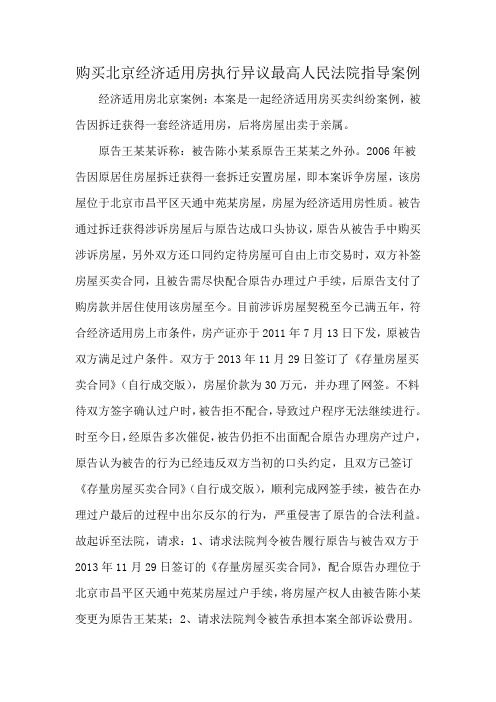
购买北京经济适用房执行异议最高人民法院指导案例经济适用房北京案例:本案是一起经济适用房买卖纠纷案例,被告因拆迁获得一套经济适用房,后将房屋出卖于亲属。
原告王某某诉称:被告陈小某系原告王某某之外孙。
2006年被告因原居住房屋拆迁获得一套拆迁安置房屋,即本案诉争房屋,该房屋位于北京市昌平区天通中苑某房屋,房屋为经济适用房性质。
被告通过拆迁获得涉诉房屋后与原告达成口头协议,原告从被告手中购买涉诉房屋,另外双方还口同约定待房屋可自由上市交易时,双方补签房屋买卖合同,且被告需尽快配合原告办理过户手续,后原告支付了购房款并居住使用该房屋至今。
目前涉诉房屋契税至今已满五年,符合经济适用房上市条件,房产证亦于2011年7月13日下发,原被告双方满足过户条件。
双方于2013年11月29日签订了《存量房屋买卖合同》(自行成交版),房屋价款为30万元,并办理了网签。
不料待双方签字确认过户时,被告拒不配合,导致过户程序无法继续进行。
时至今日,经原告多次催促,被告仍拒不出面配合原告办理房产过户,原告认为被告的行为已经违反双方当初的口头约定,且双方已签订《存量房屋买卖合同》(自行成交版),顺利完成网签手续,被告在办理过户最后的过程中出尔反尔的行为,严重侵害了原告的合法利益。
故起诉至法院,请求:1、请求法院判令被告履行原告与被告双方于2013年11月29日签订的《存量房屋买卖合同》,配合原告办理位于北京市昌平区天通中苑某房屋过户手续,将房屋产权人由被告陈小某变更为原告王某某;2、请求法院判令被告承担本案全部诉讼费用。
被告陈小某辩称:不同意原告的诉讼请求。
网签不是我们出尔反尔,过户的时候需要被告的爱人签字,因为我当时不在场,网签需要房主到网上登记,房本一直在原告那里,导致我们无法办理房屋登记出售。
如果没有前提条件(原、被告以房换房,原告以位海淀区文慧园路某房子60多平米换天通苑的房屋),天通苑的房子不可能30万出售。
网签合同有失公平。
经济适用房纠纷案例

经济适用房纠纷案例最近,某市一起关于经济适用房的纠纷案例引起了广泛关注。
该案例涉及多方利益,引发了社会各界的热议。
下面我们就来详细了解一下这起经济适用房纠纷案例的具体情况。
该案例的当事人是一位姓王的居民,他在多年前购买了一套经济适用房。
然而,最近他发现自己所购买的房屋存在严重质量问题,导致居住环境不佳,严重影响了他的生活质量。
因此,王先生向开发商提出了维权要求,希望开发商能够解决房屋质量问题并进行相应的赔偿。
然而,开发商却以种种理由推脱责任,拒绝承担相应的赔偿责任。
王先生感到非常委屈和无助,他决定通过法律途径来维护自己的合法权益。
经过一段时间的诉讼,法院最终做出了判决,要求开发商对房屋质量问题进行整改,并赔偿王先生相应的经济损失。
这起经济适用房纠纷案例引发了社会各界对于经济适用房质量和维权问题的关注。
一方面,开发商在建设经济适用房时应当严格按照相关标准和规定进行施工,确保房屋质量符合国家标准,保障购房者的合法权益。
另一方面,购房者也应当在购买经济适用房时加强对房屋质量的审核和评估,选择有信誉和实力的开发商,避免发生类似的纠纷。
综上所述,这起经济适用房纠纷案例为我们提供了一个重要的启示,购房者应当增强自我保护意识,加强对房屋质量的审核和评估,避免因房屋质量问题而导致的纠纷和损失。
同时,开发商也应当严格按照相关标准和规定进行施工,确保房屋质量符合国家标准,保障购房者的合法权益。
只有双方共同努力,才能够有效地避免类似纠纷的发生,维护好经济适用房市场的良好秩序。
希望这起经济适用房纠纷案例能够成为我们在购房和开发过程中的一面镜子,引起更多人对于经济适用房质量和维权问题的关注,共同维护好房屋市场的良好秩序。
相信在大家的共同努力下,经济适用房市场一定能够更加健康、稳定地发展。
经济适用房纠纷案例
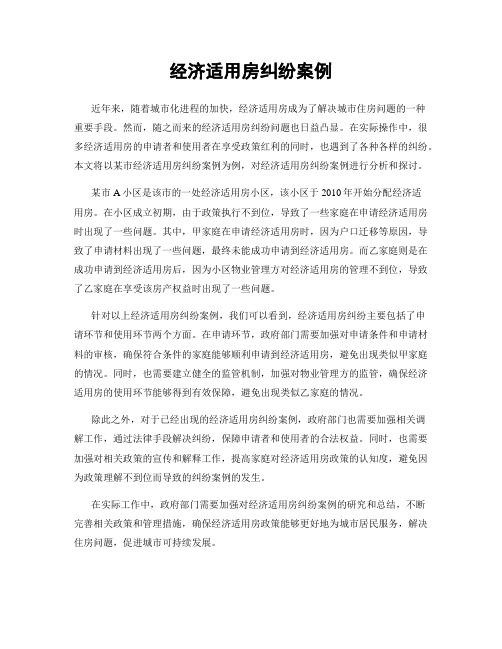
经济适用房纠纷案例近年来,随着城市化进程的加快,经济适用房成为了解决城市住房问题的一种重要手段。
然而,随之而来的经济适用房纠纷问题也日益凸显。
在实际操作中,很多经济适用房的申请者和使用者在享受政策红利的同时,也遇到了各种各样的纠纷。
本文将以某市经济适用房纠纷案例为例,对经济适用房纠纷案例进行分析和探讨。
某市A小区是该市的一处经济适用房小区,该小区于2010年开始分配经济适用房。
在小区成立初期,由于政策执行不到位,导致了一些家庭在申请经济适用房时出现了一些问题。
其中,甲家庭在申请经济适用房时,因为户口迁移等原因,导致了申请材料出现了一些问题,最终未能成功申请到经济适用房。
而乙家庭则是在成功申请到经济适用房后,因为小区物业管理方对经济适用房的管理不到位,导致了乙家庭在享受该房产权益时出现了一些问题。
针对以上经济适用房纠纷案例,我们可以看到,经济适用房纠纷主要包括了申请环节和使用环节两个方面。
在申请环节,政府部门需要加强对申请条件和申请材料的审核,确保符合条件的家庭能够顺利申请到经济适用房,避免出现类似甲家庭的情况。
同时,也需要建立健全的监管机制,加强对物业管理方的监管,确保经济适用房的使用环节能够得到有效保障,避免出现类似乙家庭的情况。
除此之外,对于已经出现的经济适用房纠纷案例,政府部门也需要加强相关调解工作,通过法律手段解决纠纷,保障申请者和使用者的合法权益。
同时,也需要加强对相关政策的宣传和解释工作,提高家庭对经济适用房政策的认知度,避免因为政策理解不到位而导致的纠纷案例的发生。
在实际工作中,政府部门需要加强对经济适用房纠纷案例的研究和总结,不断完善相关政策和管理措施,确保经济适用房政策能够更好地为城市居民服务,解决住房问题,促进城市可持续发展。
综上所述,经济适用房纠纷案例的发生是不可避免的,但是政府部门需要通过加强政策宣传、加强管理监管、加强调解工作等手段,有效化解纠纷,保障申请者和使用者的合法权益,推动经济适用房政策更好地为城市居民服务。
经适房购房合同上伪造签字
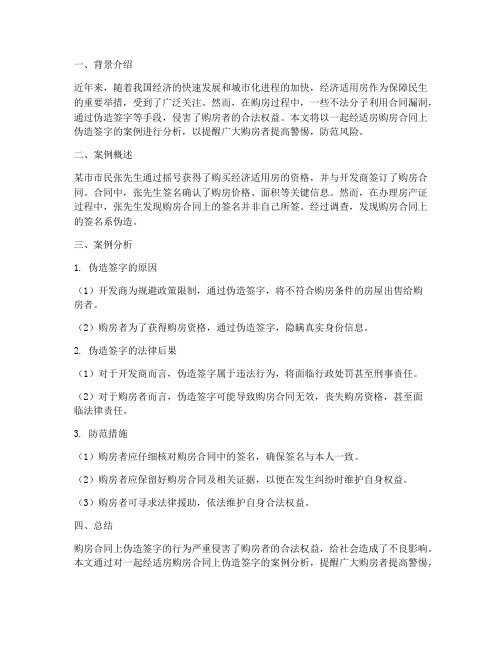
一、背景介绍近年来,随着我国经济的快速发展和城市化进程的加快,经济适用房作为保障民生的重要举措,受到了广泛关注。
然而,在购房过程中,一些不法分子利用合同漏洞,通过伪造签字等手段,侵害了购房者的合法权益。
本文将以一起经适房购房合同上伪造签字的案例进行分析,以提醒广大购房者提高警惕,防范风险。
二、案例概述某市市民张先生通过摇号获得了购买经济适用房的资格,并与开发商签订了购房合同。
合同中,张先生签名确认了购房价格、面积等关键信息。
然而,在办理房产证过程中,张先生发现购房合同上的签名并非自己所签。
经过调查,发现购房合同上的签名系伪造。
三、案例分析1. 伪造签字的原因(1)开发商为规避政策限制,通过伪造签字,将不符合购房条件的房屋出售给购房者。
(2)购房者为了获得购房资格,通过伪造签字,隐瞒真实身份信息。
2. 伪造签字的法律后果(1)对于开发商而言,伪造签字属于违法行为,将面临行政处罚甚至刑事责任。
(2)对于购房者而言,伪造签字可能导致购房合同无效,丧失购房资格,甚至面临法律责任。
3. 防范措施(1)购房者应仔细核对购房合同中的签名,确保签名与本人一致。
(2)购房者应保留好购房合同及相关证据,以便在发生纠纷时维护自身权益。
(3)购房者可寻求法律援助,依法维护自身合法权益。
四、总结购房合同上伪造签字的行为严重侵害了购房者的合法权益,给社会造成了不良影响。
本文通过对一起经适房购房合同上伪造签字的案例分析,提醒广大购房者提高警惕,加强自我保护意识。
同时,也呼吁相关部门加强对房地产市场的监管,严厉打击伪造签字等违法行为,维护房地产市场秩序。
经济适用房回购案例
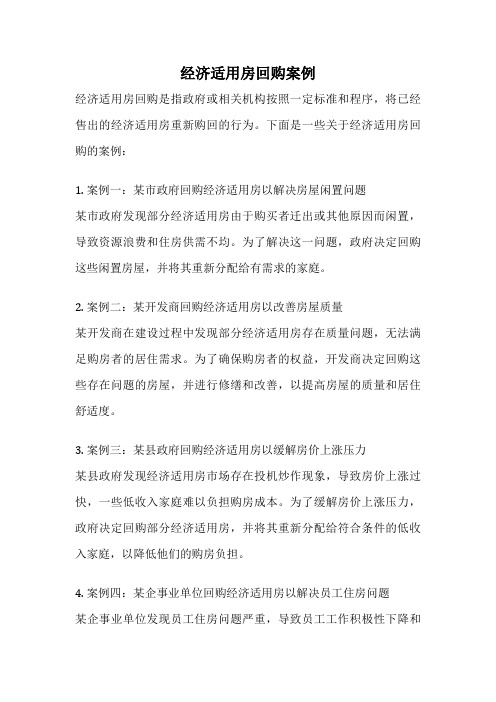
经济适用房回购案例经济适用房回购是指政府或相关机构按照一定标准和程序,将已经售出的经济适用房重新购回的行为。
下面是一些关于经济适用房回购的案例:1. 案例一:某市政府回购经济适用房以解决房屋闲置问题某市政府发现部分经济适用房由于购买者迁出或其他原因而闲置,导致资源浪费和住房供需不均。
为了解决这一问题,政府决定回购这些闲置房屋,并将其重新分配给有需求的家庭。
2. 案例二:某开发商回购经济适用房以改善房屋质量某开发商在建设过程中发现部分经济适用房存在质量问题,无法满足购房者的居住需求。
为了确保购房者的权益,开发商决定回购这些存在问题的房屋,并进行修缮和改善,以提高房屋的质量和居住舒适度。
3. 案例三:某县政府回购经济适用房以缓解房价上涨压力某县政府发现经济适用房市场存在投机炒作现象,导致房价上涨过快,一些低收入家庭难以负担购房成本。
为了缓解房价上涨压力,政府决定回购部分经济适用房,并将其重新分配给符合条件的低收入家庭,以降低他们的购房负担。
4. 案例四:某企事业单位回购经济适用房以解决员工住房问题某企事业单位发现员工住房问题严重,导致员工工作积极性下降和人才流失。
为了解决这一问题,企事业单位决定回购一些经济适用房,并将其提供给符合条件的员工,以改善他们的居住条件,提高工作积极性和员工满意度。
5. 案例五:某城市政府回购经济适用房以推动城市更新某城市政府发现城市老旧住宅区存在房屋老化、设施陈旧等问题,不利于居民的生活和城市形象的提升。
为了推动城市更新,政府决定回购这些老旧住宅,并进行拆迁和改建,以提高居民的居住环境和城市的整体品质。
6. 案例六:某房地产开发商回购经济适用房以应对经济衰退某房地产开发商在经济衰退期间发现销售经济适用房的市场需求下降,导致库存过多和资金压力增加。
为了应对经济衰退的影响,开发商决定回购一部分经济适用房,减少库存压力,同时也为购房者提供更好的售后服务和保障。
7. 案例七:某市政府回购经济适用房以推动农村危房改造某市政府发现农村存在大量危房,严重影响了农民的生活和农村的整体发展。
经济适用房案例分析
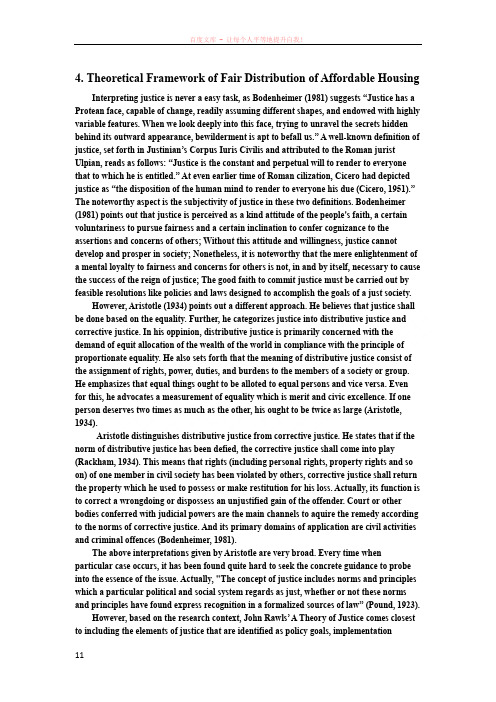
4. Theoretical Framework of Fair Distribution of Affordable HousingInterpreting justice is never a easy task, as Bodenheimer (1981) suggests “Justice has a Protean face, capable of change, readily assuming different shapes, and endowed with highly variable features. When we look deeply into this face, trying to unravel the secrets hidden behind its outward appearance, bewilderment is apt to befall us.” A well-known definition of justice, set forth in Justinian’s Corpus Iuris Civilis and attributed to the Roman jurist Ulpian, reads as follows: “Justice is the constant and perpetual will to render to everyone that to which he is entitled.” At even earlier time of Roman cilization, Cicero had depicted justice as “the disposition of the human mind to render to everyone his due (Cicero, 1951).” The noteworthy aspect is the subjectivity of justice in these two definitions. Bodenheimer (1981) points out that justice is perceived as a kind attitude of the people's faith, a certain voluntariness to pursue fairness and a certain inclination to confer cognizance to the assertions and concerns of others; Without this attitude and willingness, justice cannot develop and prosper in society; Nonetheless, it is noteworthy that the mere enlightenment of a mental loyalty to fairness and concerns for others is not, in and by itself, necessary to cause the success of the reign of justice; The good faith to commit justice must be carried out by feasible resolutions like policies and laws designed to accomplish the goals of a just society.However, Aristotle (1934) points out a different approach. He believes that justice shall be done based on the equality. Further, he categorizes justice into distributive justice and corrective justice. In his oppinion, distributive justice is primarily concerned with the demand of equit allocation of the wealth of the world in compliance with the principle of proportionate equality. He also sets forth that the meaning of distributive justice consist of the assignment of rights, power, duties, and burdens to the members of a society or group. He emphasizes that equal things ought to be alloted to equal persons and vice versa. Even for this, he advocates a measurement of equality which is merit and civic excellence. If one person deserves two times as much as the other, his ought to be twice as large (Aristotle, 1934).Aristotle distinguishes distributive justice from corrective justice. He states that if the norm of distributive justice has been defied, the corrective justice shall come into play (Rackham, 1934). This means that rights (including personal rights, property rights and so on) of one member in civil society has been violated by others, corrective justice shall return the property which he used to possess or make restitution for his loss. Actually, its function is to correct a wrongdoing or dispossess an unjustified gain of the offender. Court or other bodies conferred with judicial powers are the main channels to aquire the remedy according to the norms of corrective justice. And its primary domains of application are civil activities and criminal offences (Bodenheimer, 1981).The above interpretations given by Aristotle are very broad. Every time when particular case occurs, it has been found quite hard to seek the concrete guidance to probe into the essence of the issue. Actually, "The concept of justice includes norms and principles which a particular political and social system regards as just, whether or not these norms and principles have found express recognition in a formalized sources of law” (Pound, 1923).However, based on the research context, John Rawls’ A Theory of Justice comes closest to including the elements of justice that are identified as policy goals, implementationstrategies and evaluation criteria. A Theory of Justice developed by John Rawls (1971) has a different perspective while interpreting the meaning of justice. His theory comprises two pivotal principles:(1). An equal right is endowed to every person in the society and the core value of equal right is to embody the whole system of equal basic liberties which are adaptable with a similar system of liberty for all.(2). Inequalities from social and economic dimensions are to be organized. So, to the benefit of the least advantaged, compatible with the just savings principle, and associate to offices and positions available to all under the conditions of equal opportunity needs to be done.These two principles from A Theory of Justice primarily apply, as Rawls (1971) emphasized, to the fundamental framework of society. They are designed to administer the consignment of rights and liability, and to regulate the allocation of social and economic benefits. The basic liberty of citizens roughly includes political liberty; freedom of the right to own personal property; and freedom from arbitrary arrest. All aforesaid components of liberties are claimed by the first principle, since citizens in civil society ought to have same basic rights. The second principle applies to the allocation of wealth. Its approach is to arrange some organizations with their respective authority and responsibility, or chains of command. While the allocation is not necessarily to be equal, it must take care of everyone's advantage. Simultaneously, positions of authority and offices of command must be open to all so that every citizen can take advantage.Furthermore, Rawls (1971) advocates a four-stage sequence which demonstrates how the two principles for institutions are to be applied.(1). Agreement on the two principles of justice and a principle of just savings.(2). Crafting a Consititution to realize the two principles(3). Crafting specific laws and policies that realize the two principles within the constitutional framework.(4). Judges and administrators to apply the previously-agreed laws and policies to particular cases.Based on the above illustration, the theoretical framework involves fundamental principles of justice and the means for their application. The two principles are the basis underpinning the framework of justice. The theory elaborates the meaning of justice as fairness and devises the target of justice for the benefits of the least advantaged people. Furthermore, four stage sequence constructs a framework and sets forth the vital elements to achieve the justice.4.经济适用房分配的理论框架要给予正义以解释和定义绝非易事,正如博登海默(Bodenheimer)所说:正义有着一张普罗透斯似的脸,变化无常,随时可呈不同形状并具有极不相同的面貌,当我们仔细查看这张脸并试图揭开隐藏其表面背后的秘密时,我们往往会陷入困惑。
经济适用房法律案例(3篇)
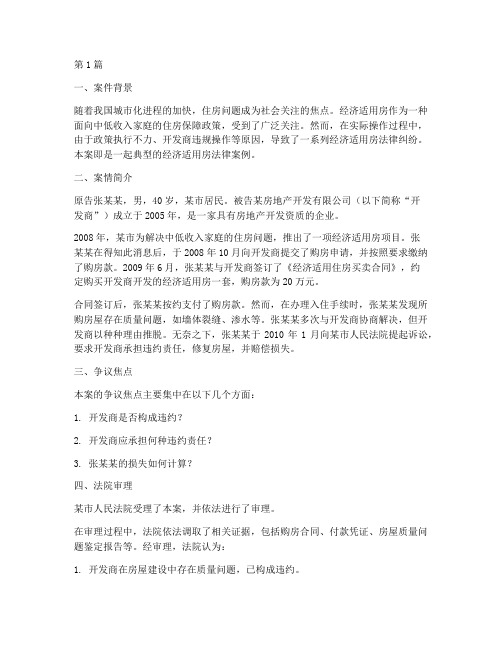
第1篇一、案件背景随着我国城市化进程的加快,住房问题成为社会关注的焦点。
经济适用房作为一种面向中低收入家庭的住房保障政策,受到了广泛关注。
然而,在实际操作过程中,由于政策执行不力、开发商违规操作等原因,导致了一系列经济适用房法律纠纷。
本案即是一起典型的经济适用房法律案例。
二、案情简介原告张某某,男,40岁,某市居民。
被告某房地产开发有限公司(以下简称“开发商”)成立于2005年,是一家具有房地产开发资质的企业。
2008年,某市为解决中低收入家庭的住房问题,推出了一项经济适用房项目。
张某某在得知此消息后,于2008年10月向开发商提交了购房申请,并按照要求缴纳了购房款。
2009年6月,张某某与开发商签订了《经济适用住房买卖合同》,约定购买开发商开发的经济适用房一套,购房款为20万元。
合同签订后,张某某按约支付了购房款。
然而,在办理入住手续时,张某某发现所购房屋存在质量问题,如墙体裂缝、渗水等。
张某某多次与开发商协商解决,但开发商以种种理由推脱。
无奈之下,张某某于2010年1月向某市人民法院提起诉讼,要求开发商承担违约责任,修复房屋,并赔偿损失。
三、争议焦点本案的争议焦点主要集中在以下几个方面:1. 开发商是否构成违约?2. 开发商应承担何种违约责任?3. 张某某的损失如何计算?四、法院审理某市人民法院受理了本案,并依法进行了审理。
在审理过程中,法院依法调取了相关证据,包括购房合同、付款凭证、房屋质量问题鉴定报告等。
经审理,法院认为:1. 开发商在房屋建设中存在质量问题,已构成违约。
2. 开发商应承担修复房屋的违约责任,并赔偿张某某因此遭受的损失。
3. 张某某的损失包括房屋修复费用、装修费用、精神损害抚慰金等。
五、判决结果根据《中华人民共和国合同法》的相关规定,法院判决如下:1. 开发商应在判决生效之日起30日内修复张某某所购房屋,修复费用由开发商承担。
2. 开发商应赔偿张某某房屋修复期间造成的装修费用、精神损害抚慰金等损失,共计人民币5万元。
经济适用房的法律纠纷(2篇)
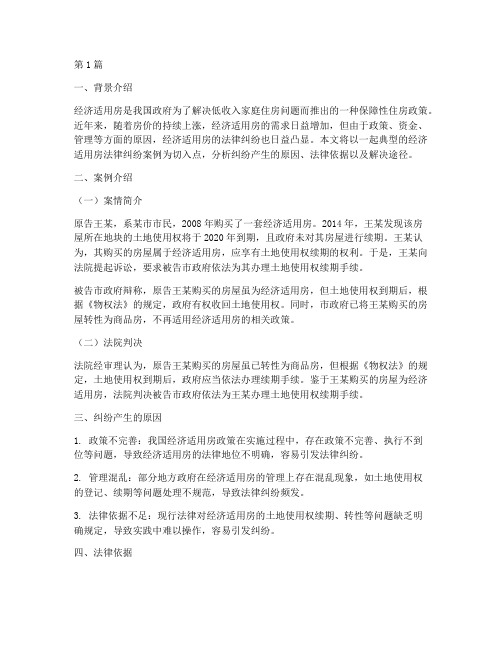
第1篇一、背景介绍经济适用房是我国政府为了解决低收入家庭住房问题而推出的一种保障性住房政策。
近年来,随着房价的持续上涨,经济适用房的需求日益增加,但由于政策、资金、管理等方面的原因,经济适用房的法律纠纷也日益凸显。
本文将以一起典型的经济适用房法律纠纷案例为切入点,分析纠纷产生的原因、法律依据以及解决途径。
二、案例介绍(一)案情简介原告王某,系某市市民,2008年购买了一套经济适用房。
2014年,王某发现该房屋所在地块的土地使用权将于2020年到期,且政府未对其房屋进行续期。
王某认为,其购买的房屋属于经济适用房,应享有土地使用权续期的权利。
于是,王某向法院提起诉讼,要求被告市政府依法为其办理土地使用权续期手续。
被告市政府辩称,原告王某购买的房屋虽为经济适用房,但土地使用权到期后,根据《物权法》的规定,政府有权收回土地使用权。
同时,市政府已将王某购买的房屋转性为商品房,不再适用经济适用房的相关政策。
(二)法院判决法院经审理认为,原告王某购买的房屋虽已转性为商品房,但根据《物权法》的规定,土地使用权到期后,政府应当依法办理续期手续。
鉴于王某购买的房屋为经济适用房,法院判决被告市政府依法为王某办理土地使用权续期手续。
三、纠纷产生的原因1. 政策不完善:我国经济适用房政策在实施过程中,存在政策不完善、执行不到位等问题,导致经济适用房的法律地位不明确,容易引发法律纠纷。
2. 管理混乱:部分地方政府在经济适用房的管理上存在混乱现象,如土地使用权的登记、续期等问题处理不规范,导致法律纠纷频发。
3. 法律依据不足:现行法律对经济适用房的土地使用权续期、转性等问题缺乏明确规定,导致实践中难以操作,容易引发纠纷。
四、法律依据1. 《物权法》第一百四十九条:土地使用权出让合同约定的使用年限届满,土地使用者需要继续使用土地的,应当至迟于届满前一年申请续期。
2. 《城市房地产管理法》第三十九条:土地使用权出让合同约定的使用年限届满,土地使用者需要继续使用土地的,应当至迟于届满前一年申请续期。
经济适用房买卖纠纷案例评析:符合一定条件的经济适用房可以交易过户

经济适⽤房买卖纠纷案例评析:符合⼀定条件的经济适⽤房可以交易过户律师观点分析【案情简介】2016年3⽉,董X与樊X、乔X、郑州市某房地产服务有限公司签订房屋买卖合同,约定樊X、乔X将其名下⼀套经济适⽤房售与董X,房款为46万元,该涉案产房登记在樊X、乔X后,由董X 承担房屋税费、差价款等事项。
后因郑州出台限购政策,房价上涨飞快,⼆卖⽅单⽅违约,董X诉⾄法院。
【律师⼯作】⼀审程序中,律师在接受董X委托后,对案情进⾏了初步的了解和分析,认为该合同依法能够继续履⾏,房产过户可以主张。
⼀、诉讼准备阶段,律师为董X起草了诉状,要求法院依法判令⼆被告继续履⾏合同,配合办理过户,并代为⽴案。
⼆、诉讼调解阶段,律师曾与樊X、乔X进⾏协商,但没有效果。
三、开庭前⼣,依法调取了房产信息、对董X⽀付房款的证据进⾏了固定、收集了郑州市有关经济适⽤房上市交易的最新政策等。
三、开庭审理阶段,樊X、乔X的律师⼀⼝咬定涉案房屋为经济适⽤房,根据法律法规规定不可上市交易,与董X的合同为⽆效合同,应依法解除,但本律师在有利的证据基础上对此观点进⾏了充分的驳斥:双⽅的合同建⽴在意思⾃治统⼀的基础上不存在胁迫等合同⽆效的情形,郑州市⽬前的政策是允许经济适⽤房在满⾜⼀定条件后上市交易的,且⽬前董X已实际居住装修,房款基本付清。
四、庭后,律师替董X起草了⼀份长达5页的代理词,从各个⽅⾯对房屋过户不存在障碍进⾏了说明,最终法院依法⽀持了董X的诉求。
⼀审判决后,对⽅不服提起上诉,其代理律师在开庭时向法庭⼜提交了郑州市房价上涨的相关材料及各地的法院判例,本律师在对该证据进⾏质证时,明确提出了两点:第⼀、房价上涨的材料来源不可信,并且也⾜以证明⼆⼈欲另⾏他售谋取⾼价,故意违约的事实。
第⼆、我国并不是判例法国家,其提交的判例并⾮最⾼⼈民法院的指导案例,不应被采信,且本案属个案,与其提交案例案情不符。
最终,⼆审法院也依法⽀持了董X要求⼆⼈继续履⾏过户义务的诉求,现该房已过户⾄董X名下,案件顺利终结。
- 1、下载文档前请自行甄别文档内容的完整性,平台不提供额外的编辑、内容补充、找答案等附加服务。
- 2、"仅部分预览"的文档,不可在线预览部分如存在完整性等问题,可反馈申请退款(可完整预览的文档不适用该条件!)。
- 3、如文档侵犯您的权益,请联系客服反馈,我们会尽快为您处理(人工客服工作时间:9:00-18:30)。
4. Theoretical Framework of Fair Distribution of Affordable HousingInterpreting justice is never a easy task, as Bodenheimer (1981) suggests “Justice has a Protean face, capable of change, readily assuming different shapes, and endowed with highly variable features. When we look deeply into this face, trying to unravel the secrets hidden behind its outward appearance, bewilderm ent is apt to befall us.” A well-known definition of justice, set forth in Justinian’s Corpus IurisCivilis and attributed to the Roman jurist Ulpian, reads as follows: “Justice is the constant and perpetual will to render to everyone that to which he is en titled.” At even earlier time of Roman cilization, Cicero had depicted justice as “the disposition of the human mind to render to everyone his due (Cicero, 1951).” The noteworthy aspect is the subjectivity of justice in these two definitions. Bodenheimer (1981) points out that justice is perceived as a kind attitude of the people's faith, a certain voluntariness to pursue fairness and a certain inclination to confer cognizance to the assertions and concerns of others; Without this attitude and willingness, justice cannot develop and prosper in society; Nonetheless, it is noteworthy that the mere enlightenment of a mental loyalty to fairness and concerns for others is not, in and by itself, necessary to cause the success of the reign of justice; The good faith to commit justice must be carried out by feasible resolutions like policies and laws designed to accomplish the goals of a just society.However, Aristotle (1934) points out a different approach. He believes that justice shall be done based on the equality. Further, he categorizes justice into distributive justice and corrective justice. In his oppinion, distributive justice is primarily concerned with the demand of equit allocation of the wealth of the world in compliance with the principle of proportionate equality. He also sets forth that the meaning of distributive justice consist of the assignment of rights, power, duties, and burdens to the members of a society or group. He emphasizes that equal things ought to be alloted to equal persons and vice versa. Evenfor this, he advocates a measurement of equality which is merit and civic excellence. If one person deserves two times as much as the other, his ought to be twice as large (Aristotle, 1934).Aristotle distinguishes distributive justice from corrective justice. He states that if the norm of distributive justice has been defied, the corrective justice shall come into play (Rackham, 1934). This means that rights (including personal rights, property rights and so on) of one member in civil society has been violated by others, corrective justice shall return the property which he used to possess or make restitution for his loss. Actually, its function is to correct a wrongdoing or dispossess an unjustified gain of the offender. Court or other bodies conferred with judicial powers are the main channels to aquire the remedy according to the norms of corrective justice. And its primary domains of application are civil activities and criminal offences (Bodenheimer, 1981).The above interpretations given by Aristotle are very broad. Every time when particular case occurs, it has been found quite hard to seek the concrete guidance to probe into the essence of the issue. Actually, "The concept of justice includes norms and principles which a particular political and social system regards as just, whether or not these norms and principles have found express recognition in a formalized sources of law” (Pound, 1923).However, based on the research context, John R awls’ A Theory of Justice comes closest to including the elements of justice that are identified as policy goals, implementationstrategies and evaluation criteria. A Theory of Justice developed by John Rawls (1971) has a different perspective while interpreting the meaning of justice. His theory comprises two pivotal principles:(1). An equal right is endowed to every person in the society and the core value of equal right is to embody the whole system of equal basic liberties which are adaptable with a similar system of liberty for all.(2). Inequalities from social and economic dimensions are to be organized. So, to the benefit of the least advantaged, compatible with the just savings principle, and associate to offices and positions available to all under the conditions of equal opportunity needs to be done.These two principles from A Theory of Justice primarily apply, as Rawls (1971) emphasized, to the fundamental framework of society. They are designed to administer the consignment of rights and liability, and to regulate the allocation of social and economic benefits. The basic liberty of citizens roughly includes political liberty; freedom of the right to own personal property; and freedom from arbitrary arrest. All aforesaid components of liberties are claimed by the first principle, since citizens in civil society ought to have same basic rights. The second principle applies to the allocation of wealth. Its approach is to arrange some organizations with their respective authority and responsibility, or chains of command. While the allocation is not necessarily to be equal, it must take care of everyone's advantage. Simultaneously, positions of authority and offices of command must be open to all so that every citizen can take advantage.Furthermore, Rawls (1971) advocates a four-stage sequence which demonstrates how the two principles for institutions are to be applied.(1). Agreement on the two principles of justice and a principle of just savings.(2). Crafting a Consititution to realize the two principles(3). Crafting specific laws and policies that realize the two principles within the constitutional framework.(4). Judges and administrators to apply the previously-agreed laws and policies to particular cases.Based on the above illustration, the theoretical framework involves fundamental principles of justice and the means for their application. The two principles are the basis underpinning the framework of justice. The theory elaborates the meaning of justice as fairness and devises the target of justice for the benefits of the least advantaged people. Furthermore, four stage sequence constructs a framework and sets forth the vital elements to achieve the justice.4.经济适用房分配的理论框架要给予正义以解释和定义绝非易事,正如博登海默(Bodenheimer)所说:正义有着一张普罗透斯似的脸,变化无常,随时可呈不同形状并具有极不相同的面貌,当我们仔细查看这张脸并试图揭开隐藏其表面背后的秘密时,我们往往会陷入困惑。
